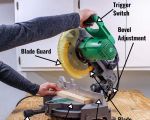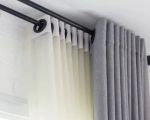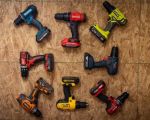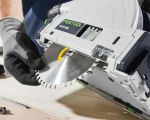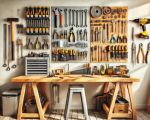
May 19, 2025
Must-Have Tools for Beginner Woodworkers
Starting Your Woodworking Journey
Starting as a beginner woodworker can feel like stepping into an exciting yet overwhelming world. There’s so much to learn, and it can be difficult to know where to start. One of the most important factors in becoming proficient in woodworking is having the right tools. These tools not only help you create beautiful projects but also ensure that your work is efficient and safe. So, let’s dive into the must-have tools for beginner woodworkers to make your journey into the craft a smoother and more enjoyable experience.
1. Essential Power Tools for Beginners
For those new to woodworking, power tools are often the quickest and most efficient way to get the job done. These tools come in a range of sizes, from compact to large, and they offer precision and power to complete many tasks. Here are a few must-have power tools:
1.1 Circular Saw
A circular saw is one of the most versatile power tools you’ll need. This tool allows you to cut wood quickly and precisely. Whether you are making straight cuts for a table top or trimming down lumber, a circular saw is invaluable in your toolkit. It's easy to use and doesn’t require the level of expertise that a table saw demands, making it perfect for beginners.
1.2 Jigsaw
Another essential power tool is a jigsaw. It allows you to make curved or intricate cuts in wood, which is useful for creating designs and shapes for more advanced projects. The jigsaw is lightweight, easy to maneuver, and an absolute must-have for any beginner woodworker who wants to tackle projects beyond basic straight cuts.
1.3 Drill/Driver Combo Kit
When working with wood, you’ll need a tool that can drive screws and drill holes. A drill/driver combo kit is perfect for this purpose. It offers both drilling and driving functions, making it versatile and essential for assembling furniture, attaching hardware, and building structures. A good drill/driver combo can also be used with different bits, increasing its utility for various tasks.
2. Hand Tools for Precision
While power tools are crucial for efficiency, hand tools are necessary for precision work. These tools help you create detailed, accurate cuts and shapes that might be difficult to achieve with power tools alone.
2.1 Tape Measure and Ruler
Precision is key in woodworking, and a good tape measure and ruler will help you make accurate measurements for your projects. Choose a reliable, durable measuring tape, as measurements are crucial for cutting, aligning, and joining pieces of wood. A square ruler is also useful to ensure right angles in your work.
2.2 Sawhorses
A pair of sturdy sawhorses provides support for your wood when cutting, sanding, or assembling. They make it easier to work on larger pieces of wood, giving you a stable platform that keeps your materials at a comfortable height.
2.3 Chisels
Chisels are essential for carving, shaping, and detailing wood. A good set of chisels, ranging from large to small, is necessary for any beginner. You’ll need chisels to refine cuts, remove excess wood, or even carve intricate designs. A sharpening stone will help keep your chisels in peak condition.
3. Safety Tools
Safety should always be your top priority when woodworking. Having the right safety equipment ensures you avoid injuries while working with sharp tools and heavy machinery.
3.1 Safety Glasses
Dust and debris are common when cutting, sanding, or drilling, so wearing safety glasses will protect your eyes from flying wood chips and dust. It’s important to choose glasses that are comfortable and durable for extended use.
3.2 Hearing Protection
Some power tools, like saws and drills, can be quite loud, and prolonged exposure to loud noise can damage your hearing. A good pair of earmuffs or earplugs will protect your hearing and make your work environment more comfortable.
3.3 Dust Mask
Woodworking can produce a lot of dust, which can be harmful to your lungs over time. A dust mask or respirator is essential when working with saws, sanders, or routers to protect your respiratory system.
4. Workshop Accessories
While power tools and hand tools are the main focus, there are other accessories that can make your woodworking process more enjoyable and efficient.
4.1 Workbench
Having a sturdy workbench is crucial for organizing your tools and creating a stable surface for your projects. You can purchase a ready-made workbench, or you can build your own. A workbench with clamps, drawers, or tool storage will help you stay organized.
4.2 Clamps
Clamps are essential for holding wood pieces together as you glue or screw them. When starting, having a set of various-sized clamps will allow you to handle many projects, from gluing smaller pieces to securing larger ones for drilling.
4.3 Wood Glue
No woodworking project is complete without a reliable wood glue. This is the secret to creating strong joints between pieces of wood. Choose a good quality wood glue that dries clear and provides strong adhesion.
5. Recommendations and Where to Buy
As you get started with woodworking, it’s crucial to invest in high-quality tools to ensure safety, efficiency, and precision. You don’t need to buy everything at once, but start with the essentials and gradually build your collection as you gain experience. Many of these tools can be purchased from local hardware stores or online at specialized retailers. For those new to woodworking, [ToolNest](https://www.toolnest.com) offers a wide selection of tools and accessories for every skill level.
6. Conclusion
With the right tools, woodworking can be an incredibly rewarding and enjoyable hobby or career. As a beginner, you don’t need to own every tool on the market, but focusing on the basics will give you everything you need to start making your first projects. Over time, you’ll find your preferences, and you can start adding to your toolkit. Remember to always focus on safety and precision as you learn the craft.

